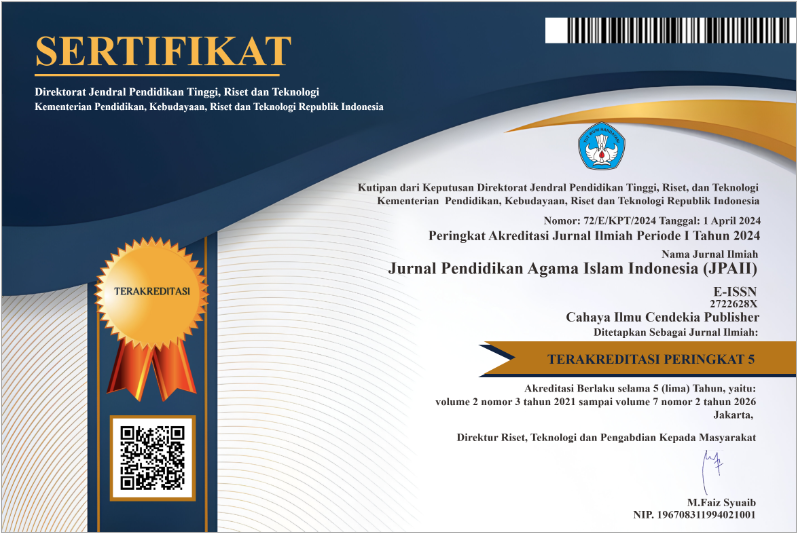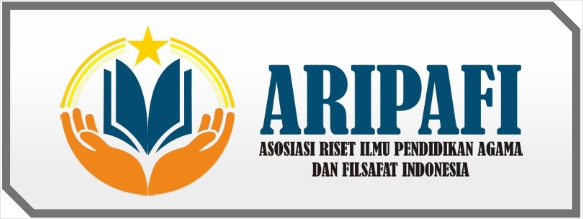Motivation to Learn to Read Al-Qur'an Students
Abstract
Purpose of the study: Motivation to learn to read the Qur'an is a driving force that arises both from outside and from within a person or student who encourages them to carry out noble worship activities whose rewards are multiplied by Allah if they read them seriously and play an important role in giving enthusiasm, enthusiasm and pleasure in learning to read Al-Qur'an. The purpose of this study was to determine the motivation to learn to read the Qur'an of students at Madrasah Nurul Jihad, indicators of learning motivation.
Methodology: This type of research is a qualitative descriptive research. The population in this study were 13 grade IV students and 28 grade V students at Madrasah Nurul Jihad. Data in this study were collected using questionnaires, interviews and documentation. Furthermore, the collected data was analyzed using the percentage formula.
Main Findings: The research shows that: students of grades IV and V at Madrasah Nurul Jihad are very good at learning to read Al-Qur'an. All learning activities to read the Qur'an are carried out, but not optimal or perfect. The indicator of learning motivation is taken from the operational concept.
Novelty/Originality of this study: This research presents findings that illustrate how the madrasah environment, family support, and students' internal factors influence their motivation to master the skill of reading the Al-Qur'an. By understanding these motivations, this research provides valuable insights into the development of more effective and in-depth learning approaches in the madrasa context, which can increase interest and quality of Al-Qur'an learning for students.
References
A. M. Najib, “Reestablishing Indonesian Madhhab ’Urf and the contribution of intellectualism1,” Al-Jami’ah, vol. 58, no. 1, pp. 171–208, 2020, doi: 10.14421/ajis.2020.581.171-208.
E. Cañas, E. Estévez, M. C. Martínez-Monteagudo, and B. Delgado, “Emotional adjustment in victims and perpetrators of cyberbullying and traditional bullying,” Soc. Psychol. Educ., vol. 23, no. 4, pp. 917–942, 2020, doi: 10.1007/s11218-020-09565-z.
Apdoludin and Martinisyamin, “Modeling Analysis, Findings, Development, Organizing the Material and Learning for Students in Islamic Boarding Schools,” J. Pendidik. Islam, vol. 8, no. 1, pp. 25–36, 2022, doi: 10.15575/jpi.v8i1.15277.
M. Z. Anwar, Fathan, Warto, and O. N. Hidayati, “Transformation of Economic Theology For Community Empowerment A Case Study on Pesantren-Based Bank Wakaf Mikro,” J. Indones. Islam, vol. 17, no. 1, pp. 76–99, 2023, doi: 10.15642/JIIS.2023.17.1.76-99.
J. Kormos and K. Csizér, “The Interaction of Motivation, Self-Regulatory Strategies, and Autonomous Learning Behavior in Different Learner Groups,” TESOL Q., vol. 48, no. 2, pp. 275–299, 2014, doi: 10.1002/tesq.129.
A. Kasdi, “Reconstruction of fiqh Nusantara: Developing the Ijtihad methodology in formulating fiqh from Indonesian perspective,” Qudus Int. J. Islam. Stud., vol. 7, no. 2, pp. 239–266, 2019, doi: 10.21043/qijis.v7i2.4797.
A. Asrori, “Contemporary religious education model on the challenge of indonesian multiculturalism,” J. Indones. Islam, vol. 10, no. 2, pp. 261–283, 2016, doi: 10.15642/JIIS.2016.10.2.261-284.
H. C. A. Kistoro, E. Latipah, and N. M. Burhan, “Probing Experiential Learning Approach in Islamic Religious Education,” J. Pendidik. Islam, vol. 9, no. 2, pp. 157–168, 2023, doi: 10.15575/jpi.v9i2.24374.
B. Ridwan, I. Syahputra, A. A. Tarigan, F. A. Siregar, and Nofialdi, “Islam Nusantara, ulemas, and social media: Understanding the pros and cons of Islam Nusantara among ulemas of West Sumatera,” Indones. J. Islam Muslim Soc., vol. 9, no. 2, pp. 163–188, 2019, doi: 10.18326/IJIMS.V9I2.163-188.
S. Suciati, “The Impact of Prenatal Education Through Stimulating Quran’S Recitation on Child’S Growth,” QIJIS (Qudus Int. J. Islam. Stud., vol. 3, no. 2, pp. 129–147, 2015.
Marwazi and M. Husnul Abid, “Traditional Madrasah, State Policies and the Rise of Integrated Islamic Schools in Jambi,” J. Indones. Islam, vol. 15, no. 1, pp. 75–102, 2021, doi: 10.15642/JIIS.2021.15.1.75-102.
A. Kuswaya and M. Ali, “The concept of peace in the Qur’an: A socio-thematic analysis of Muslims’ contestation in Salatiga, Indonesia,” Qudus Int. J. Islam. Stud., vol. 9, no. 1, pp. 73–102, 2021, doi: 10.21043/QIJIS.V9I1.10483.
M. A. Abdullah, “Islam as a cultural capital in Indonesia and the Malay world: A convergence of Islamic studies, social sciences and humanities,” J. Indones. Islam, vol. 11, no. 2, pp. 307–328, 2017, doi: 10.15642/JIIS.2017.11.2.307-328.
A. Mas’ud, A. Z. Fuad, and A. Zaini, “Evolution and orientation of Islamic education in Indonesia and Malaysia,” J. Indones. Islam, vol. 13, no. 1, pp. 1–20, 2019, doi: 10.15642/JIIS.2019.13.1.21-49.
I. Mujahid, “Islamic orthodoxy-based character education: creating moderate Muslim in a modern pesantren in Indonesia,” Indones. J. Islam Muslim Soc., vol. 11, no. 2, pp. 185–212, 2021, doi: 10.18326/ijims.v11i2.185-212.
A. N. Kawakip and Sulanam, “The Practice of Shared Values and Islamic Educational Identity,” J. Indones. Islam, vol. 17, no. 1, pp. 27–53, 2023, doi: 10.15642/JIIS.2023.17.1.27-53.
J. W. Creswell, Research Design Qualitative, quantitative, and mixed methods approaches. Thousand Oaks, CA: Sage, 2014.
I. Mundzir and Y. Muthmainnah, “The progressiveness of Quranic interpretation in the fatwa of Muhammadiyah on female circumcision,” Indones. J. Islam Muslim Soc., vol. 12, no. 2, pp. 285–311, 2022, doi: 10.18326/ijims.v12i2.285-311.
N. Nurdin, “To research online or not to research online: Using internet-based research in Islamic Studies context,” Indones. J. Islam Muslim Soc., vol. 7, no. 1, pp. 31–54, 2017, doi: 10.18326/ijims.v7i1.31-54.
Raihani, “A model of Islamic teacher education for social justice in Indonesia a critical pedagogy perspective,” J. Indones. Islam, vol. 14, no. 1, pp. 163–186, 2020, doi: 10.15642/JIIS.2020.14.1.163-186.
M. A. F. Santoso and Y. Khisbiyah, “Islam-based peace education: Values, program, reflection and implication,” Indones. J. Islam Muslim Soc., vol. 11, no. 1, pp. 185–207, 2021, doi: 10.18326/IJIMS.V11I1.185-207.
H. C. A. K. Kistoro, B. K. Kartowagiran, E. L. Latipah, N. N. Naim, and H. P. Putranta, “Implementation of Islamic religious learning strategies in children with autism in Indonesia,” Spec. Edukac. i Rehabil., vol. 19, no. 4, pp. 227–246, 2020, doi: 10.5937/SPECEDREH19-28813.
M. Yaseen Gada, “On pluralism, religious ‘other’, and the Quran: a post September-11 discourse,” Indones. J. Islam Muslim Soc., vol. 6, no. 2, pp. 241–271, 2016, doi: 10.18326/ijims.v6i2.241-271.
S. Arifin, “Islamic religious education and radicalism in Indonesia: Strategy of de-radicalization through strengthening the living values education,” Indones. J. Islam Muslim Soc., vol. 6, no. 1, pp. 93–126, 2016, doi: 10.18326/ijims.v6i1.93-126.
I. Sutomo and Budihardjo, “The rejection of religious nationalism towards the secular state and the Islamic caliphate: Indonesian religious figures perspective,” Indones. J. Islam Muslim Soc., vol. 11, no. 1, pp. 115–137, 2021, doi: 10.18326/IJIMS.V11I1.115-137.
A. Ushuluddin, A. Madjid, S. Masruri, and M. Affan, “Shifting paradigm: From Intellectual Quotient, Emotional Quotient, and Spiritual Quotient toward Ruhani Quotient in ruhiology perspectives,” Indones. J. Islam Muslim Soc., vol. 11, no. 1, pp. 139–162, 2021, doi: 10.18326/IJIMS.V11I1.139-162.
E. F. Rusydiyah, “Social education through digital literacy among Indonesian female muslim activists the experience of Abdurrahman Wahid’s daughters,” J. Indones. Islam, vol. 14, no. 1, pp. 210–247, 2020, doi: 10.15642/jiis.2020.14.1.210-247.
Copyright (c) 2023 Ellya Suriyani, Desi Desi

This work is licensed under a Creative Commons Attribution-NonCommercial 4.0 International License.
Authors who publish with this journal agree to the following terms:
- Authors retain copyright and acknowledge that the Jurnal Pendidikan Agama Islam Indonesia (JPAII) is the first publisher licensed under a Creative Commons Attribution 4.0 International License.
- Authors are able to enter into separate, additional contractual arrangements for the non-exclusive distribution of the journal's published version of the work (e.g., post it to an institutional repository or publish it in a book), with an acknowledgment of its initial publication in this journal.
- Authors are permitted and encouraged to post their work online (e.g., in institutional repositories or on their website) prior to and during the submission process, as it can lead to productive exchanges and earlier and greater citation of published work.






.png)
.png)





















